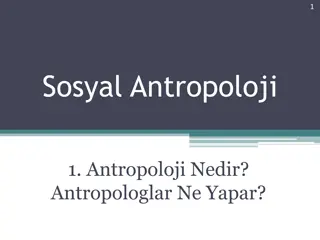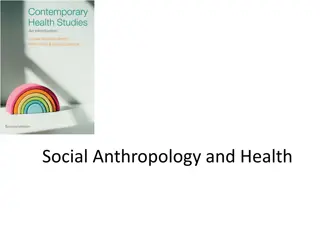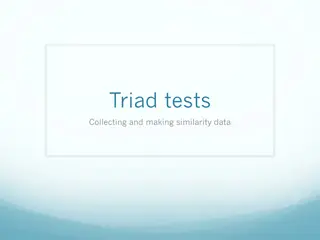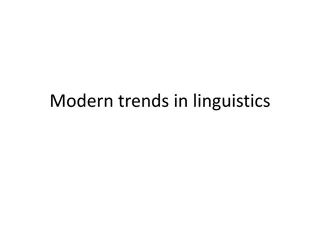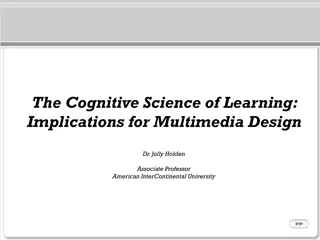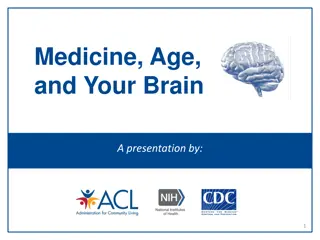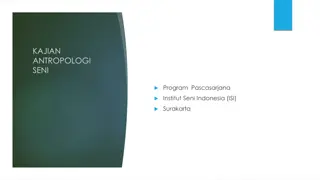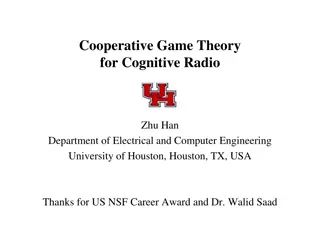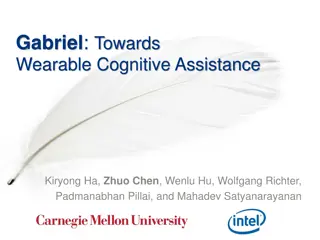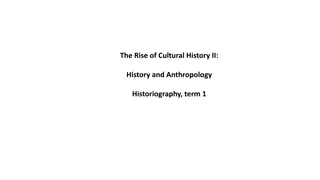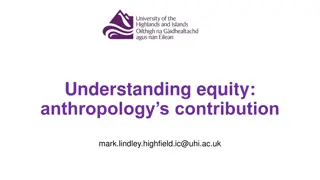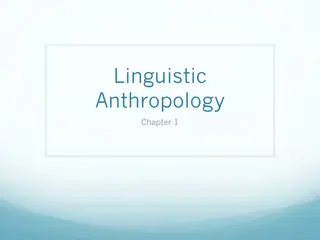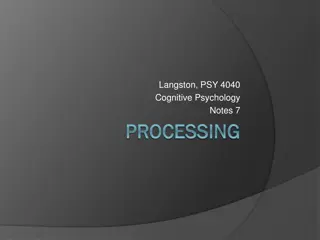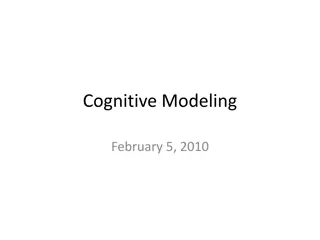Cognitive Load Classification with 2D-CNN Model in Mental Arithmetic Task
Cognitive load is crucial in assessing mental effort in tasks. This paper discusses using EEG signals and a 2D-CNN model to classify cognitive load during mental arithmetic tasks, aiming to optimize performance. EEG signals help evaluate mental workload, although they can be sensitive to noise. The
0 views • 19 slides
Brain Mineral Deposition and Cognitive Decline Study
Investigating the progression pattern of brain mineral deposition as a differential indicator of cognitive decline in individuals with varying cognitive statuses from normal to Alzheimer's disease. The study aims to develop improved imaging techniques and specific cognitive-relevant atlases to under
4 views • 24 slides
Explore Anthropology and Sociology at Our Department
Anthropology and Sociology departments offer culturally relevant classes addressing key societal issues such as race relations, health, migration, and more. Meet our renowned faculty members specializing in various anthropological and sociological fields of study. From urban anthropology to gender i
3 views • 17 slides
Introduction to Anthropology: What Anthropologists Do
Anthropology is the study of human societies and cultures to understand the various aspects of human existence and connections between different elements. It encompasses physical anthropology, linguistic anthropology, cultural anthropology, and social anthropology, delving into topics such as evolut
3 views • 21 slides
Understanding the Cognitive Assessment System (CAS2) Theory and Applications
The Cognitive Assessment System (CAS2), developed by Dr. Jane Yeomans, is a comprehensive tool for assessing cognitive processes in children aged 5 to 18. Unlike traditional IQ tests, CAS2 focuses on areas like Planning, Attention, Simultaneous, and Successive processing. It requires Level 2 qualifi
1 views • 29 slides
Understanding Cognitive Behavioral Therapy (CBT) by Dr. James Ikonomopoulos
Explore the foundations and application of Cognitive Behavioral Therapy (CBT) through the work of Dr. James Ikonomopoulos. Uncover the connection between thoughts, feelings, and behaviors, learn cognitive and behavioral interventions for children and adults, and delve into the cognitive model of the
0 views • 64 slides
Understanding the Intersection of Social Anthropology and Health
Social anthropology investigates the cultural and social dimensions of health, providing insights into how illness and medical care are shaped by cultural contexts. This discipline explores the impact of culture on individual health, highlighting how collective beliefs influence perceptions of healt
0 views • 20 slides
Understanding Cognitive Testing in Aging: A Vital Assessment Tool
Cognitive testing plays a crucial role in assessing cognitive abilities and distinguishing normal aging from disease states in older adults. This program, a partnership between OneWorld and UNMC's Geriatrics Workforce Enhancement Program, highlights the importance of cognitive testing, its objective
0 views • 17 slides
Introduction to Cognitive Behavioral Therapy (CBT) for Beginners
Delve into the origins, principles, and applications of Cognitive Behavioral Therapy (CBT) through an exploration of its history, theory, and practical skills. Learn how CBT targets cognitive distortions and behaviors to enhance mental health and develop coping strategies. Discover the fundamental a
0 views • 23 slides
Introduction to Socio-Cultural Anthropology: Understanding Human Societies
Explore the holistic study of mankind in Anthropology, delving into various branches, perspectives, and the scope of Social Anthropology. Learn about the relationship of Social Anthropology with other disciplines and its significance in understanding human societies.
1 views • 9 slides
Understanding Human-Computer Interaction and Cognitive Learning Theories
Human-Computer Interaction (HCI) focuses on how people interact with computers, while theories like Sweller's Cognitive Load Theory and Mayer's Cognitive Theory of Multimedia Learning explain how individuals process information. These theories emphasize optimizing learning by managing cognitive load
4 views • 8 slides
Cognitive Stimulation Therapy in Post-Acute Care: A Pilot Study
Cognitive Stimulation Therapy (CST) is an evidence-based group intervention designed for individuals with mild to moderate cognitive impairment. It aims to enhance cognitive functioning through various activities such as executive functioning tasks, multi-sensory stimulation, and reminiscence work.
0 views • 9 slides
Predictive Performance of CSF A1-42 and Tau on Cognitive Decline and Dementia Progression
Analysis conducted at the Perelman School of Medicine, University of Pennsylvania, evaluated the predictive performance of cerebrospinal fluid markers A1-42, t-tau, and p-tau181 on cognitive decline and progression to dementia. The study included 2401 ADNI1/GO/2 CSF samples from individuals across d
0 views • 19 slides
Cognitive Behavioral Therapy for Psychosis: Concepts and Applications
Explore the foundational principles of Cognitive Behavioral Therapy (CBT) for psychosis, emphasizing how thoughts influence feelings and behaviors. Gain insights into the cognitive-behavioral model of paranoia and learn about the main tenets of CBTp. Discover how CBTp can effectively address psychot
0 views • 63 slides
Early Childhood Language Learning and Bilingualism
Early childhood is a critical period for language acquisition and the development of bilingualism. Exposure to multiple languages from a young age has significant cognitive benefits. Bilingualism is a common phenomenon worldwide, with many individuals speaking more than one language. The cognitive i
0 views • 109 slides
Brain Health Messaging for Health Education: Promoting Cognitive Well-being
Evidence-based programs for older adults focus on managing health conditions that are risk factors for cognitive decline, such as diabetes, smoking, and heart disease. By incorporating cognitive health messages into promotions, individuals are encouraged to address these risk factors early to suppor
0 views • 5 slides
Understanding America Study: Cognitive Functioning Measures
The Understanding America Study (UAS) focuses on developing web-based cognitive functioning measures, including tests for fluid abilities, verbal skills, executive function, and processing speed. Utilizing data from about 9,000 panelists, tests like the Stop and Go Switch task are administered onlin
0 views • 26 slides
Understanding Triad Tests in Cognitive Anthropology
Triad tests are a valuable tool in cognitive anthropology, originally introduced by George Kelly in 1955. They involve presenting individuals with sets of three items and eliciting responses based on similarity or dissimilarity. This method allows researchers to explore differences in cognition acro
1 views • 27 slides
Addressing Cognitive Dysfunction in Patients with Cancer: Causes, Impact, and Treatment
Understanding cognitive dysfunction in cancer patients is crucial for improving quality of life and medical outcomes. This article explores the background, causes, screening, diagnosis, and treatment options for cancer-related cognitive impairment, emphasizing the historical perspective, prevalence,
0 views • 60 slides
Master Programmes in Artificial Intelligence for Human-Centric AI Careers
Explore the world of Cognitive Systems and Cognitive Programming for Human-Centric AI at the University of Cyprus. Delve into building systems that think and behave like humans, learn from experiences, and adapt to changing circumstances. Discover the ethical considerations of Cognitive Systems and
0 views • 17 slides
NSF Graduate Research Fellowship - Dr. Michele Buzon, Department of Anthropology
The NSF Graduate Research Fellowship, overseen by Dr. Michele Buzon from the Department of Anthropology, offers a stipend of approximately $34,000 along with $12,000 for the institution. The fellowship is open to U.S. citizens, nationals, and permanent residents. Eligibility criteria include having
0 views • 4 slides
Understanding Cognitive Disorders in Psychiatry: A Comprehensive Overview
Cognitive disorders disrupt higher brain functions, impacting memory, attention, and decision-making abilities. This article explores the classification of cognitive disorders, focusing on delirium, a common syndrome characterized by consciousness disturbance and cognitive changes. Delirium predomin
0 views • 26 slides
Enhancing Cognitive Flexibility for Employability
Cognitive flexibility is a crucial skill for adapting to new situations and problem-solving in today's competitive job market. This module focuses on identifying, assessing, and enhancing cognitive flexibility to nurture competitiveness and employability. Learn how to recognize the importance of cog
0 views • 24 slides
Cognitive and Behavioral Management Strategies for Traumatic Brain Injury Patients
This presentation focuses on addressing challenging cognitive, behavioral, and personality issues associated with traumatic brain injury (TBI). It outlines cognitive issues such as attention, speed of processing, learning, memory, and executive functioning. Cognitive management strategies include te
0 views • 18 slides
Understanding Psychophysical Methods in Cognitive Neuroscience
This collection of images explores the field of psychophysics, focusing on perception, reality, behavior, and the analysis of cognitive functions. The images delve into the reasons for studying psychophysical methods, the complexity of neuro-cognitive phenomena, and the importance of behavioral meas
0 views • 21 slides
Impact of Yoga on Cognitive Functioning in Aging Adults
Aging is often accompanied by a decline in cognitive functions, affecting areas such as memory, attention, and reasoning. This article explores the relationship between aging and cognitive impairment, along with various treatment options including drug therapy, dietary interventions, and cognitive e
0 views • 42 slides
Exploring Cognitive Linguistics: A Modern Approach to Language Analysis
Cognitive linguistics is an approach that views language as interconnected with cognitive capacities, emphasizing language's role in organizing and conveying information. It examines how linguistic structures reflect conceptual organization, categorization principles, and environmental influences, h
0 views • 21 slides
Exploring Modern Trends in Linguistics
Cognitive linguistics, functional grammar, text linguistics, and communicative linguistics are shaping the field of linguistics in the 21st century. These trends delve into the cognitive aspects of language, emphasizing language's role in organizing and conveying information. Cognitive linguistics h
0 views • 37 slides
Evolution of Cognitive Counseling and Aaron T. Beck's Contribution
In the historical context following World War II, a shift occurred in psychology towards cognitive counseling with the emergence of cognitive therapy by Aaron T. Beck. Beck, a psychoanalytically trained psychiatrist, challenged traditional psychoanalytic concepts and developed cognitive therapy to t
0 views • 26 slides
The Cognitive Science of Learning: Implications for Multimedia Design
Cognitive science is the interdisciplinary study of human intelligence, involving fields such as philosophy, psychology, artificial intelligence, neuroscience, linguistics, and anthropology. It aims to understand human knowledge, how it is acquired and processed, and its various forms. This field ex
0 views • 45 slides
Understanding Aging, Medicines, and Cognitive Health
As we age, changes in our body and brain can affect how we react to medicines. Elderly adults often face health problems requiring medication, which can impact cognitive functions. Certain drugs may cause cognitive side effects like confusion and memory loss. It's essential to discuss all medication
0 views • 8 slides
Exploring Anthropology of Art: Perspectives and Studies on Cultural Expressions
This text delves into the intersection of anthropology and art, focusing on the importance of anthropological approaches in studying artistic subjects. It covers various topics such as the nature of art, methodologies, theoretical frameworks, and case studies. The discussed themes include the role o
0 views • 7 slides
Cognitive Radio Network and Game Theory Exploration at University of Houston
Explore the application of cooperative game theory in cognitive radio networks, focusing on spectrum sensing, dynamic spectrum access, and coalitional games. Detailed overview of research conducted at the Department of Electrical and Computer Engineering, University of Houston. Learn about cognitive
0 views • 42 slides
The Relationship Between Cognitive Flexibility and Psychological Flexibility After Acquired Brain Injury
This study explores how cognitive flexibility and psychological flexibility interact after an acquired brain injury. It examines whether individuals who exhibit cognitive inflexibility can achieve psychological flexibility, considering the impact of cognitive impairments post-injury. Cognitive flexi
0 views • 21 slides
Advancements in Wearable Cognitive Assistance Technology
This presentation explores the potential of wearable technology in aiding cognitive decline, such as mild cognitive impairment and survivors of stroke. It delves into how wearable devices can continuously capture, interpret, and give guidance to users, potentially saving millions of dollars in healt
0 views • 25 slides
The Rise of Cultural History II: History and Anthropology Historiography
This content explores the concepts of cultural history, Marxist thought, cultural hegemony, and the works of Antonio Gramsci. It delves into the history of anthropology, discussing key figures such as Franz Boas and Malinowski, and highlights the intersection of anthropology and history in understan
0 views • 9 slides
Understanding Equity in Anthropology: Contributions and Challenges
Anthropology plays a crucial role in understanding and addressing issues of equity, particularly in education. In Scotland, initiatives such as the Scottish Attainment Challenge and Pupil Equity Funding aim to bridge the gap in educational outcomes for pupils from disadvantaged backgrounds. While th
0 views • 16 slides
Understanding Linguistic Anthropology and Anthropology: A Comprehensive Overview
Delve into the realm of linguistic anthropology and anthropology to explore the study of humans, culture, language, biology, artifacts, and more. Discover the four fields of anthropology, the holistic approach, and the importance of cultural relativism while avoiding ethnocentrism. Learn how linguis
0 views • 25 slides
Understanding Memory Processing in Cognitive Psychology
Exploring memory processing in cognitive psychology, this content dives into deeper processing, its impact on memory, the importance of retrieval cues, and strategies to enhance studying effectiveness. Delve into the complexities of memory encoding through various cognitive tasks and cognitive codes
0 views • 65 slides
Understanding Cognitive Modeling in Learning Sciences
Cognitive modeling is a key aspect of simulating human problem-solving and mental processes in computerized models. It involves the use of various types of cognitive models, such as production-rule systems and constraint-based models, to predict human behavior and performance on tasks. This field en
0 views • 83 slides



